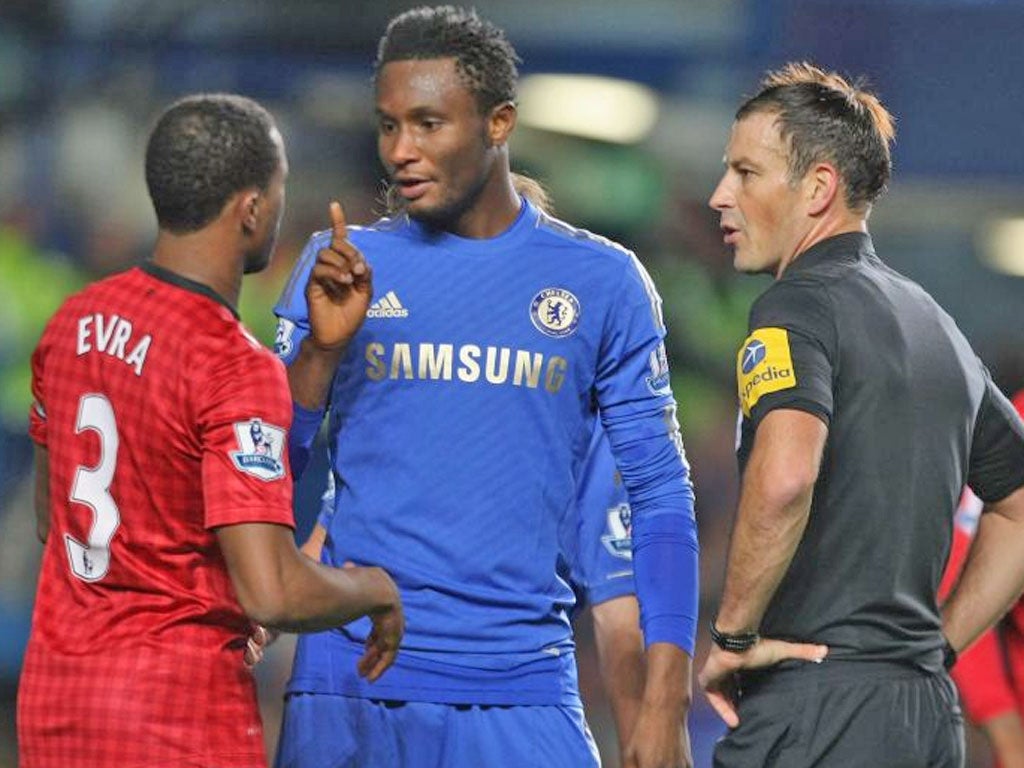Chelsea's problem is that everything is seen through John Terry prism
Difficult decision for club to make accusation given recent history involving their captain

Surely there is not a single employee of Chelsea Football Club who arrived at Stamford Bridge on Sunday morning to open up the ground, to welcome Manchester United, who wanted that night to end this way.
But, on the night of the match, it was left to club officials to file a complaint about the conduct of Mark Clattenburg. The complaint went to Premier League match delegate Nick Cusack, who would pass it on to the Football Association. And the first lines were written of what could be months of acrimony, legal debate and the intense, bitter unpleasantness which seems to stain everything English football touches this decade.
On Sunday, Chelsea were still dealing with the loss of John Terry. Their captain was sat in the stands, for the second match of his four-game ban for language used almost exactly one year before. All he could do was watch as Robin van Persie educated David Luiz and Gary Cahill. Throughout, the United fans made clear what they thought of Terry's conduct and also that of Ashley Cole during the whole sorry affair.
The whole racial abuse issue is still everywhere. The home fans, for their part, were not exactly hospitable to Rio Ferdinand, also reminding him that Terry had been England captain before him, and after. Terry, of course, is still Chelsea captain, and has two games of his ban left. That great unravelling which started at Loftus Road last October may yet have careers to upset. It nearly upturned the Professional Footballers' Association last week.
So when Chelsea officials heard about the complaints of their players regarding Clattenburg, there must have been caution. Not just a natural caution born of any issue this serious but also one based on recent events. Who could possibly want to see anything resembling the last 12 months take place a second time?
Chelsea will not have taken the evidence they had lightly. They will not have taken the implications lightly. They certainly will not have taken the potential process lightly. They are, despite Sunday's loss, top of the Premier League, playing the most attractive football in the country, driven by the outstanding player so far this season in Juan Mata and the two most exciting, Oscar and Eden Hazard. They do not need a distraction.
But clearly there was a sense, in the bowels of Stamford Bridge, at around 7pm on Sunday evening, that this was a matter of the utmost seriousness and one which Chelsea would engage firmly. If the club felt that their players had been wronged – and, clearly, they do – they have a duty to support them.
The issue, though, is one of perceived credibility. There is a toxic accusation about that Chelsea, after the public humiliation of recent months, are interested to feel how the shoe feels on the other foot. If there is anger at how their captain was treated by the authorities, how would the authorities like to see their representative tainted in the same way? If all language on the pitch is actionable, then can Chelsea be the victims as well as the perpetrators?
What that reading shows is that it is impossible for Chelsea to escape from the prism of the Terry affair. Their anti-racism measures are very important to the club. Owner Roman Abramovich feels very strongly about anti-Semitism and discrimination and is keen for his club to appear as welcoming as possible.
There was a "One Game, One Community" banner paraded on the pitch by schoolchildren before kick-off on Sunday. The Chelsea players were all wearing their "Kick It Out" T-shirts. Chelsea work desperately hard to eradicate the problem of racism among some of their supporters. Stephen Fitzwater was banned from Chelsea for life this summer after racially abusing Didier Drogba. They work tirelessly before and during games with Tottenham Hotspur because of what might be said or sung.
But credibility on these issues is easy to lose and hard to win back. To many in the game and outside, the fact that it was John Terry who wrote in Sunday's programme notes that Chelsea are "committed to eradicating all forms of discrimination from our game" was an absurdity too far, even in the Premier League, even in 2012.
Chelsea, their critics say, had a perfect chance to make a meaningful stand this month. They could have stripped Terry of the captaincy after he declined to appeal against the FA independent regulatory commission's four-game ban. But there he was, in Donetsk last week, striding out with his anti-racism captaincy armband. He will lead Chelsea out again a week tomorrow against Shakhtar before returning to domestic football and domestic captaincy against Liverpool on Remembrance Sunday.
So Chelsea, trying to fight on behalf of players they feel have been wronged, have an issue. They are serious about this. They may, in time, be shown to be right. But after recent events they find their credentials on these matters impugned. And so they have a job to persuade and convince the world that, while this is not what they wanted, they mean what they say.
Join our commenting forum
Join thought-provoking conversations, follow other Independent readers and see their replies
Comments
Bookmark popover
Removed from bookmarks